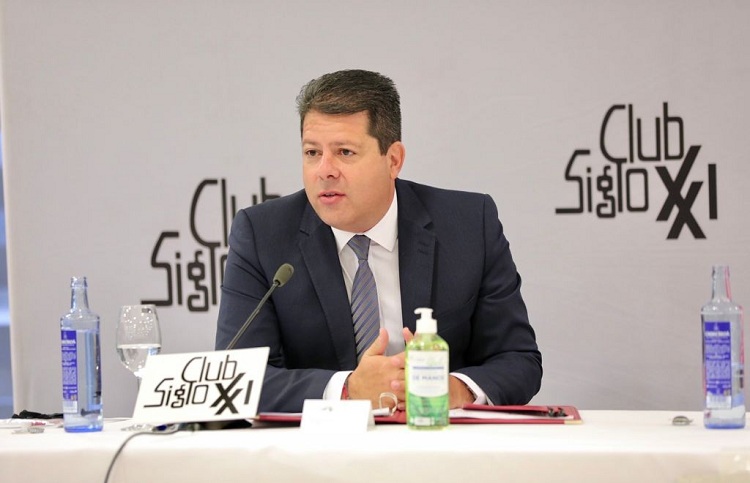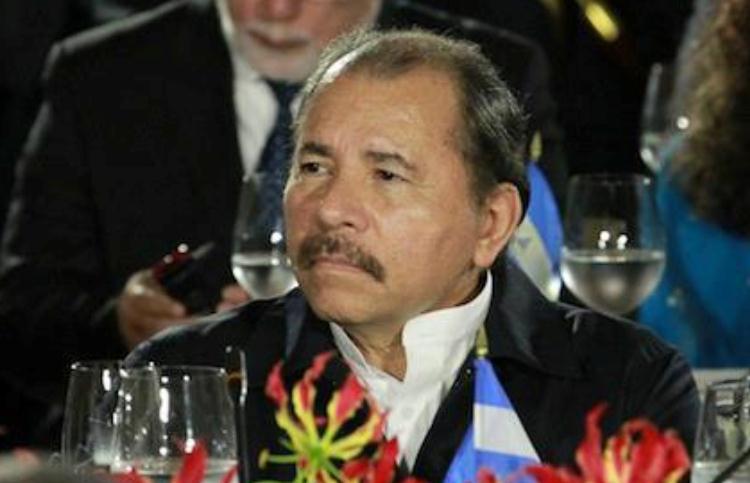Eduardo González
The Chief Minister of Gibraltar, Fabian Picardo, yesterday praised the “dialogue” attitude of some of the Spanish Foreign Ministers before or after Jose Manuel Garcia-Margallo, who, like Arancha Gonzalez Laya, held meetings with the leaders of the Rock and “have not yet regretted” it.
This was stated by Picardo during an event organized in Madrid by the Club Siglo XXI, which was also attended by the UK ambassador to Spain, Hugh Elliott, and whose beginning was interrupted by shouts of “Spanish Gibraltar” from an unknown source. After the initial confusion, the security services were able to locate a loudspeaker connected to a cell phone that someone had introduced in the room to try to boycott the event. The event was later claimed, via Twitter, by the youth of Vox, who declared that “the pirate Picardo must be received as he deserves”.
Once the incident was over, the event was presented by Hugh Elliot, who stressed that, in the “close and historic” relationship between the United Kingdom and Spain, Gibraltar has always been “the stone in the shoe”. “It is obvious that the respective positions on sovereignty are very different and both governments are very clear that their positions will not change”, but the New Year’s Eve Agreement (signed last December 31 and which initialed the entry of Gibraltar in the Schengen Area and the lifting of the fence) will allow “to overcome an image of the past in which everyone lost in favor of one in which everyone can win”.
During his speech (the first in Madrid since February 2015, when an event of the New Economy Forum was suspended due to pressure from the Government and had to be held a day later in another venue in the capital), Fabian Picardo praised the “positive mood” shown by the various Foreign Ministers since the departure of “the one who, in the days following the Brexit referendum, announced that in four years the Spanish flag would fly over the Rock” (alluding to Margallo). In that sense, he dedicated special praise to his immediate successor, Alfonso Dastis, who, when “he was still president of the Government Mariano Rajoy”, bet on a “dialogue position” that resulted in a meeting between the two. “In February we started, in a discreet meeting, to inform each other of our positions” and, “since then, we did notice a qualitative change in the Spanish position,” he added.
That same position, he assured, was maintained with Josep Borrell, who “understood that a hard Brexit for Gibraltar would have been very bad, not only for the Gibraltarians, but for all the inhabitants of the Campo de Gibraltar area”, and with the current minister, Arancha González Laya, with whom, despite the “state of alarm” caused by the COVID-19, he was able to hold a meeting “in person, with a mask and in the Campo de Gibraltar” in July 2020. “It was a meeting that raised many negative and unwelcome comments by those who never seem to want us to see each other’s faces,” he continued (the meeting was harshly criticized by PP, Ciudadanos and Vox). “Well even more courageous then seem to me (Fernando) Moran, (Miguel Angel) Moratinos, Dastis, Borrell and Laya, as all have met senior ministers of Gibraltar and I think it is true to say that none, yet, has repented,” said Picardo.
Sovereignty and the Brand Gibraltar / Campo de Gibraltar
That “dialoguing position”, he assured, is not incompatible with the discrepancies regarding sovereignty, an issue in which the two parties maintain positions “equally non-negotiable”. “From the Government of Spain, the position of both the Popular Party and the Socialist Party has been identical in relation to sovereignty” and González Laya herself, “answering the parliamentary opposition, in the Congress of Deputies, commented that she would defend the Spanish claim to sovereignty ‘tooth and nail’,” she continued. “We all have tooth and nail,” warned Picardo, who recalled that in the 2003 referendum 99% of Gibraltarians voted to remain part of the United Kingdom.
Therefore, Picardo celebrated that Spanish and British decided to “set aside” the issue of sovereignty during the negotiations of the agreements to regulate relations after Brexit because “the views are absolutely entrenched” and the goal, he said, was to reach an agreement that allows “to establish the Gibraltar and Campo de Gibraltar brand as one of the most prestigious”, since “a quarter of the world’s merchant fleet passes through the Strait of Gibraltar every year.”
“We embrace the opportunity to see Europe’s most battered area become one of the most prosperous areas, not in Europe, but on the planet,” he continued. “Gibraltar does not want to be Monaco, but we do aspire to be an even more dynamic economic engine for the mutual benefit of all the people of Campo de Gibraltar and Gibraltar itself,” he added. “What is good for Gibraltar is good for Spain and very good for that hard hit part of Spain which is the Campo de Gibraltar,” said Picardo.






